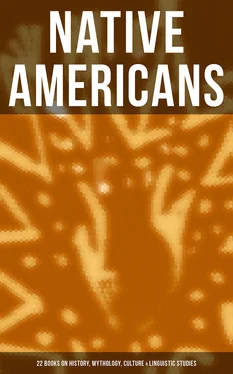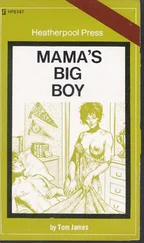In another form of the tradition it is said that while playing with the Tornit a young Inung fell down and broke his neck. The Tornit feared that the Inuit might take revenge upon them and left the country.
Many old ditties are sung which either treat of the Tornit or are reported to have been sung by them. Some of them will be found in the linguistic account connected with my journey.
The Woman and the Spirit of the Singing House
Table of Contents
Once upon a time a woman entered the singing house when it was quite dark. For a long time she had wished to see the spirit of the house, and though the Inuit had warned her of the impending danger she had insisted upon her undertaking.
She summoned the spirit, saying, “If you are in the house, come here.” As she could not see him, she cried, “No spirit is here; he will not come.” But the spirit, though yet invisible, said, “Here I am; there I am.” Then the woman asked, “Where are your feet; where are your shins; where are your thighs; where are your hips; where are your loins?” Every time the spirit answered, “Here they are; there they are.” And she asked further, “Where is your belly?” “Here it is,” answered the spirit. “Where is your breast; where are your shoulders; where is your neck; where is your head?” “Here it is; there it is;” but in touching the head the woman all of a sudden fell dead. It had no bones and no hair ( p. 597).
The Constellation Udleqdjun
Table of Contents
Three men went bear hunting with a sledge and took a young boy with them. When they approached the edge of the floe they saw a bear and went in pursuit. Though the dogs ran fast they could not get nearer and all of a sudden they observed that the bear was lifted up and their sledge followed. At this moment the boy lost one of his mittens and in the attempt to pick it up fell from the sledge. There he saw the men ascending higher and higher, finally being transformed into stars. The bear became the star Nanuqdjung (Betelgeuse); the pursuers, Udleqdjun (Orion’s belt); and the sledge, Kamutiqdjung (Orion’s sword). The men continue the pursuit up to this day; the boy, however, returned to the village and told how the men were lost.
Origin of the Adlet and of the Qadlunait
Table of Contents
Savirqong, an old man, lived alone with his daughter. Her name was Niviarsiang (i.e., the girl), but as she would not take a husband she was also called Uinigumissuitung (she who would not take a husband). She refused all her suitors, but at last a dog, spotted white and red, whose name was Ijirqang, won her affection and she took him for a husband. They had ten children, five of whom were Adlet and five dogs. The lower part of the body of the Adlet was that of a dog and hairy all over, the soles excepted, while the upper part was that of a man. When the children grew up they became very voracious, and as the dog Ijirqang did not go out hunting at all, but let his father in law provide for the whole family, it was difficult for Savirqong to feed them. Moreover, the children were awfully clamorous and noisy; so at last the grandfather got tired of it, put the whole family into his boat, and carried them to a small island. He told the dog Ijirqang to come every day and fetch meat.
Niviarsiang hung a pair of boots round his neck and he swam across the narrow channel. But Savirqong, instead of giving him meat, filled the boots with heavy stones, which drowned Ijirqang when he attempted to return to the island.
The daughter thought of revenging the death of her husband. She sent the young dogs to her father’s hut and let them gnaw off his feet and hands. In return Savirqong, when Niviarsiang happened to be in his boat, threw her overboard and cut off her fingers when she held to the gunwale. As they fell into the sea they were transformed into seals and whales. At last he allowed her to climb into the boat.
As she feared that her father might think of killing or maiming her children, she ordered the Adlet to go inland, where they became the ancestors of a numerous people. She made a boat for the young dogs, setting up two sticks for masts in the soles of her boots, and sent the puppies across the ocean. She sang: “Angnaijaja. When you arrive there across the ocean you will make many things giving you joy. Angnaija.” They arrived in the land beyond the sea and became the ancestors of the Europeans.
Table of Contents
A long time ago the ocean suddenly began to rise, until it covered the whole land. The water even rose to the top of the mountains and the ice drifted over them. When the flood had subsided the ice stranded and ever since forms an ice cap on the top of the mountains. Many shellfish, fish, seal, and whales were left high and dry and their shells and bones may be seen to this day. A great number of Inuit died during this period, but many others, who had taken to their kayaks when the water commenced to rise, were saved.
Table of Contents
In days of yore, an enormous man, whose name was Inugpaqdjuqdjualung, lived in company with many other Inuit in a village on a large fjord. He was so tall that he could straddle the fjord. He used to stand thus every morning and wait for whales to pass beneath him. As soon as one came along he stooped and caught it, just as another man would scoop up some little thing that had fallen into the water, and he ate it as other men eat a small piece of meat.
One day all the natives had manned their boats to hunt a whale. Inugpaqdjuqdjualung at the time was sitting lazily near his hut, but when he saw the efforts of the men he scooped both whale and boats from the water and placed them upon the beach.
At another time, being tired from running about, he lay down on a high hill to take a nap. The Inuit told him that a couple of huge bears had been seen near the village, but he said he didn’t care, and told his friends to rouse him by throwing large stones upon him if they should see the bears coming. They did so and Inugpaqdjuqdjualung, suddenly starting up, cried: “Where are they? Where are they?” When the Inuit pointed them out he said: “What! those little things? Those are not worth the bustle; they are small foxes, not bears,” and he crushed one between his fingers, while he put the other into the eyelet of his boot and strangled it there.
Table of Contents
This story is reprinted from Hall (II, p. 240):
Many moons ago, a woman obtained a polar bear cub but two or three days old. Having long desired just such a pet, she gave it her closest attention, as though it were a son, nursing it, making for it a soft warm bed alongside her own, and talking to it as a mother does to her child. She had no living relative, and she and the bear occupied the house alone. Kunikdjuaq, as he grew up, proved that the woman had not taught him in vain, for he early began to hunt seals and salmon, bringing them to his mother before eating any himself, and receiving his share from her hands. She always watched from the hilltop for his return, and if she saw that he had been unsuccessful, she begged from her neighbors blubber for his food. She learned how this was from her lookout, for if successful, he came back in the tracks made on going out, but if unsuccessful always by a different route. Learning to excel the Inuit in hunting, he excited their envy, and, after long years of faithful service, his death was resolved upon. On hearing this, the old woman, overwhelmed with grief, offered to give up her own life if they would but spare him who had so long supported her. Her offer was sternly refused. Upon this, when all his enemies had retired to their houses, the woman had a long talk with her son—now well grown in years—telling him that wicked men were about to kill him, and that the only way to save his life and hers was for him to go off and not return. At the same time she begged him not to go so far that she could not wander off and meet him, and get from him a seal or something else which she might need. The bear, after listening to what she said with tears streaming down her furrowed cheeks, gently placed one huge paw on her head, and then throwing both around her neck, said, “Good mother, Kunikdjuaq will always be on the lookout for you and serve you as best he can.” Saying this, he took her advice and departed, almost as much to the grief of the children of the village as to the mother.
Читать дальше












